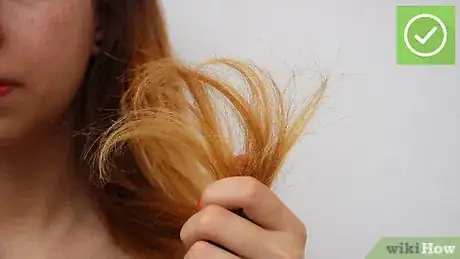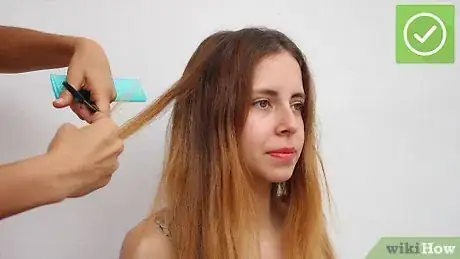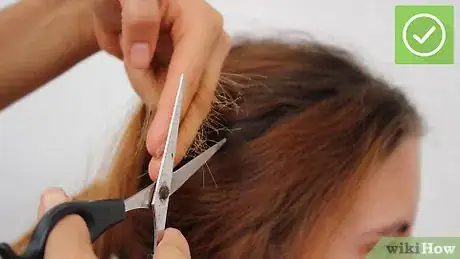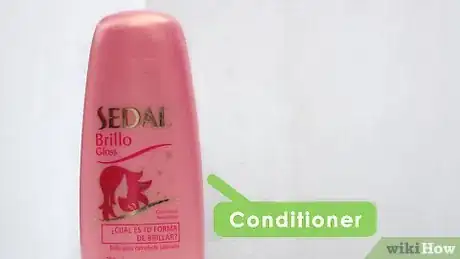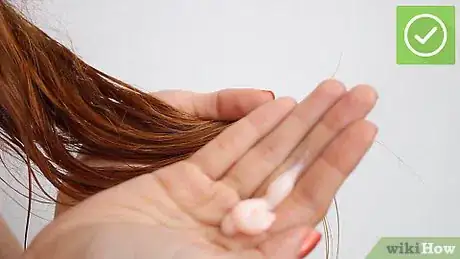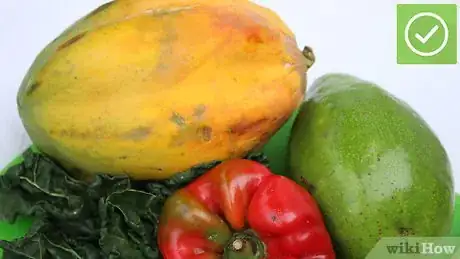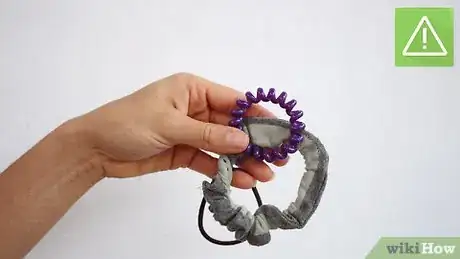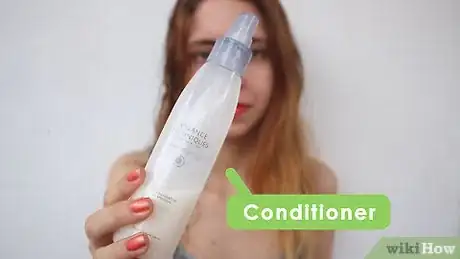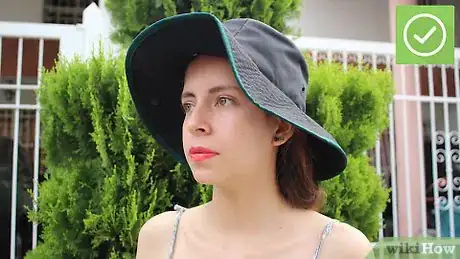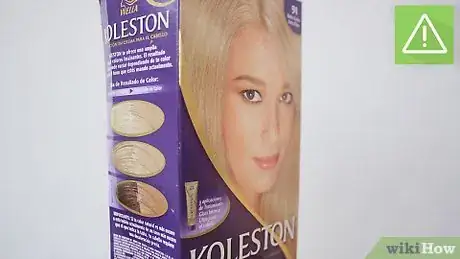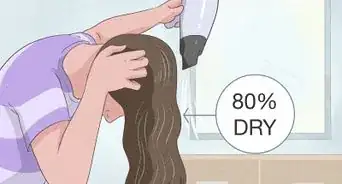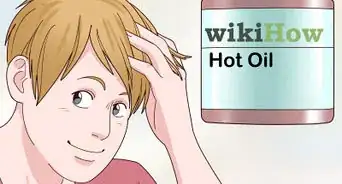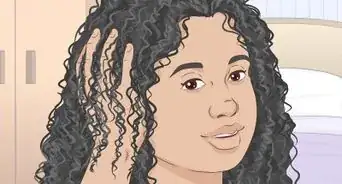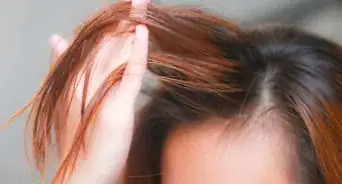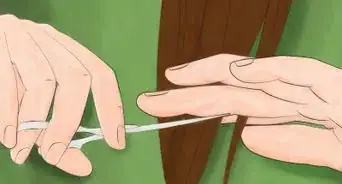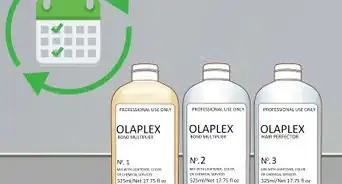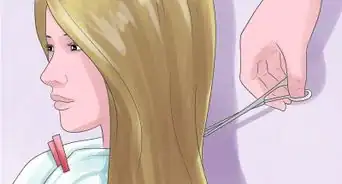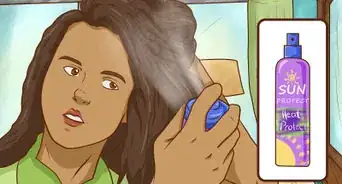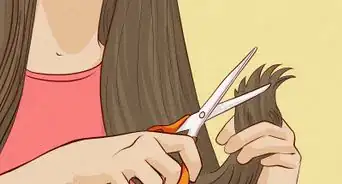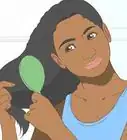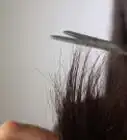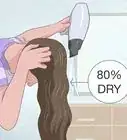This article was co-authored by Arthur Sebastian. Arthur Sebastian is the Owner of Arthur Sebastian Hair Salon in San Francisco, California. Arthur has worked as a hair stylist for over 20 years and received his Cosmetology License in 1998. He believes that the true work of a successful hair stylist comes from passion and a love for hairdressing.
There are 10 references cited in this article, which can be found at the bottom of the page.
This article has been viewed 3,463,101 times.
Split ends aren't fun, and they always seem to reappear not too long after you get rid of them. Fortunately, there are things you can do to get rid of split ends and protect your hair so they don't come back.
Steps
Removing Split Ends
-
1Check for damaged hair. You don’t actually need to locate split ends to tell if your hair is damaged. It will feel dry and tangled if it is. However, if you want to find the split ends, closely examine your hair with the help of a mirror and good lighting. Split ends occur most often at the tip but can show up anywhere in your hair. Split ends and related damage can occur in several different forms. If you find any of the following, you may want to remove them:[1]
- Hair tips splitting into two or more strands
- White dots at the end of your hair
- Single strand knots (more common in dry, curly hair)
-
2Trim them yourself. If you're not due for a full haircut, you can take care of the split ends yourself. Trim them off using a small pair of hair shears, since scissors can fray your hair and lead to more split ends. Cut single strands about 0.25 inches (0.64 cm) above the split. If you cut too close to the damage, the split may reappear.[2]
- Some splits form a small ball directly above the damage. Make sure to cut above this.
- Keep in mind that only trimming the split ends may change or ruin the look of your haircut. For best results, see a hair stylist to get your hair trimmed.
Advertisement -
3Cut your hair regularly. A hairdresser can always trim off split ends, but will usually remove about 1⁄4 to 1 inch (0.6 to 2.5 cm) of your hair along with them. Eventually, all hair will wear out enough to require this treatment. How long you wait between haircuts depends on your hair type, hair health, and how much time you're willing to spend hunting down your own split ends. This can be anywhere from 4 weeks to 3 months.[3]
- If you aren't trimming split ends yourself, avoiding the hairdresser will not save your long hair. Neglected split ends will become weaker and weaker, eventually breaking off.
-
4Take steps to save hair length. If trimming off split ends are affecting your hair length goals, consider having your hair cut into layers. Ask the hairdresser to trim damaged hair in the surface layer, while leaving lower layers — and length intact. If you have afro-textured hair, a mild texturizer can achieve a similar effect, allowing you to manipulate your hair more easily and avoid trimming healthy hair.
-
5Treat hair repair products with caution. There are conditioners and other commercial treatments that claim to "heal" split ends. These seal the split ends shut to hide them from view, but the damage is still there. You can use these as a temporary fix, but relying on them long-term may dry out your hair and lead to worse damage.[4]
Washing, Drying, and Brushing for Healthy Hair
-
1Apply shampoo carefully. Too much shampoo can strip away healthy oils, leaving your hair vulnerable to damage. Follow these tips to find a regimen that minimizes split ends:[5]
- Wash your hair no more than 3 times per week (or less often if you have thick curls or afro-textured hair.)
- Wash only your scalp and the hair nearest to it. Leave the rest of your hair down. It should receive enough washing from the shampoo that runs down on its own.
- Hot water strips away protective oils, so rinse your hair with the coolest water you can stand.
-
2Use conditioner. After shampooing, rinse your hair and squeeze it out to remove most of the water. Then, apply conditioner along the length of your hair, but make sure to focus on the ends. Let it soak at least 3 minutes before you rinse it out.[6]
-
3Dry hair gently. Vigorously rubbing your hair dry with a towel may cause damage to your hair. Instead, gently squeeze dripping wet hair with a microfiber towel to remove excess water. Once the excess water is removed, let your hair air dry naturally.
- If you need to speed up the drying, use a blow dryer on a medium or low setting, preferably set to blow cool air. Hold it a few inches (several centimeters) away from your hair to minimize damage.
- If you normally wrap your hair in a towel, try a cotton T-shirt instead.
-
4Deep condition regularly. If your conditioner regimen isn't working, try a "deep condition" once or twice a month. Skip the fancy deep conditioning products, though. The best product to use for deep conditioning is coconut oil, which has the right chemical structure to sink deep into your hair. To deep condition:[7]
- Get your hair just wet enough so it is damp.
- Place a dollop of coconut oil on your palm. If it's in a solid state, gently rub it between your palms until it becomes liquid.
- Rub it through your hair.
- Let it sit for 5 to 10 minutes for very damaged hair.
- Rinse out with cold water.
-
5Find a gentle comb or brush. Your brush or comb should aid you in untangling your hair, not pulling it out. The best option for people with thick hair is a wide-toothed, wooden comb or pick. People with thin hair may use a narrow-toothed, wooden comb or a brush with boar bristles or another flexible, natural bristle.
-
6Brush or comb gently. Start at the bottom and work your way up. When you encounter a tangle, stop and untangle it with your fingers before you continue brushing.
- Stop teasing or backcombing your hair. This pulls up the scales of your hair, making it easy to break them off.
- Do not brush more than necessary. Once the brush or comb runs through your hair without obstruction, you're done.
- Hair is very fragile when wet. Brush it only when dry, unless you have curly hair, which should only be brushed when it is wet.
Protecting Your Hair
-
1Protect your hair while sleeping. Sleep with your hair in a braid or bun to help prevent tangles and breakage. A sleep cap or a satin pillowcase may help as well.
-
2Eat a balanced diet. Make sure to eat the recommended amounts of vitamins and protein to ensure that your body produces the healthiest hair possible. Healthy fats such as omega-3 fatty acids can also help keep your hair whole and shiny.[8]
- Vitamin E is particularly useful. Vitamin E can be found in many foods, such as nuts, seeds, avocado, vegetable oils, some leafy greens, and some fish.
-
3Oil your hair for protection. Use a nutrient-rich oil such as almond oil, argan oil, egg oil, castor oil, or extra-virgin olive oil. This can lubricate the hair shaft, preventing it from splitting. Oil up to twice a week, leave it on overnight under a cap, and it wash off in the morning.[9]
- Avoid products that contain paraffin or kerosene, which cause drying.
- Apply oil to the middle and ends of your hair. Applying oil near the scalp can cause a buildup of dandruff or damage the roots.
-
4Use hair-friendly accessories. Tight, elastic bands or any bands with metal parts can damage hair, especially if left in for a long time. Scrunchies and ribbons treat your hair more gently.
- If you do need to use an elastic or rubber band, make sure it's not too tight so it doesn't cause breakage.[10]
-
5Apply a hair mask. A hair mask once every 1 or 2 weeks can help keep your hair healthy, moisturized, and damage-free. Leave it on for thirty minutes, everywhere except near your scalp.[11]
- Try mixing your own out of olive oil, honey, and conditioner.
Avoiding Damage
-
1Protect your hair from heat. Heat denatures the keratins (proteins) of the hair shaft weakening it and making it prone to split ends. Heat treatments are a major cause of damage and split ends. This includes hot blow drying, heat styling, straightening and curling through heat, and steam treatments.[12] If you do use these treatments, take these precautions:[13]
- Do not straighten or use other high-heat treatments more often than once every two weeks, or preferably once a month.
- Look for irons or other tools that allow for exact temperature control. Keep them set to below 356ºF (180ºC).
- Let hair stylists know that you prefer low-heat treatments.
-
2Protect your hair before swimming in a pool, ocean, or lake. Consider applying a special pre-swimming moisturizer product. Alternatively, use a leave-in conditioner, oil your hair, and/or wear a swim cap. Rinsing your hair thoroughly before swimming may reduce its absorption of harmful chemicals. Be sure to rinse and shampoo your hair as soon as possible after swimming.
-
3Protect your hair from the sun. Ultraviolet rays can be as damaging to your hair as your skin. Wear your hair in a bun underneath a hat, or use leave-in sunscreen conditioner
-
4Reduce reliance on dye, perms, and bleach. Hair dyes, perms, and bleach are particularly damaging, but any product can damage your hair. Try to limit how often you get your hair colored, permed, and bleached. Instead, opt for occasional touch ups to dye and bleach, such as once every 6 to 8 weeks.
- For example, if you have dyed or bleached hair, get root touch ups only as needed. Do not re-dye all of your hair every time the roots grow out.
- If you have a perm, only get it touched up when it is absolutely necessary, or consider not getting it permed again at all if your hair is damaged.
Expert Q&A
Did you know you can get expert answers for this article?
Unlock expert answers by supporting wikiHow
-
QuestionWhy do I have a lot of split ends?
 Laura MartinLaura Martin is a Licensed Cosmetologist in Georgia. She has been a hair stylist since 2007 and a cosmetology teacher since 2013.
Laura MartinLaura Martin is a Licensed Cosmetologist in Georgia. She has been a hair stylist since 2007 and a cosmetology teacher since 2013.
Licensed Cosmetologist
-
QuestionCan you repair your split ends?
 Laura MartinLaura Martin is a Licensed Cosmetologist in Georgia. She has been a hair stylist since 2007 and a cosmetology teacher since 2013.
Laura MartinLaura Martin is a Licensed Cosmetologist in Georgia. She has been a hair stylist since 2007 and a cosmetology teacher since 2013.
Licensed Cosmetologist
-
QuestionWhat happens if you do not cut your split ends?
 Laura MartinLaura Martin is a Licensed Cosmetologist in Georgia. She has been a hair stylist since 2007 and a cosmetology teacher since 2013.
Laura MartinLaura Martin is a Licensed Cosmetologist in Georgia. She has been a hair stylist since 2007 and a cosmetology teacher since 2013.
Licensed Cosmetologist
Things You'll Need
- Regular hair trims
- Weekly hair mask
- Conditioner
- Leave in conditioner and hair detangler
- Wide-toothed comb
- Proper hairbands (if used)
- Pair of hair scissors
References
- ↑ https://analyticalsciencejournals.onlinelibrary.wiley.com/doi/full/10.1002/dta.1652
- ↑ https://www.girllovesglam.com/cut-split-ends/
- ↑ Arthur Sebastian. Professional Hair Stylist. Expert Interview. 29 April 2019.
- ↑ https://www.ncbi.nlm.nih.gov/pmc/articles/PMC4387693/
- ↑ https://www.sciencealert.com/how-often-you-should-wash-your-hair-according-science
- ↑ Arthur Sebastian. Professional Hair Stylist. Expert Interview. 29 April 2019.
- ↑ https://www.theverge.com/2016/9/11/12864726/hair-products-shampoo-conditioner-science
- ↑ https://www.hairscientists.org/hair-and-scalp-conditions/nutrition-and-hair-health
- ↑ https://www.webmd.com/beauty/natural-oils
- ↑ Arthur Sebastian. Professional Hair Stylist. Expert Interview. 29 April 2019.
- ↑ https://www.youtube.com/watch?v=_impJozcldo
- ↑ Arthur Sebastian. Professional Hair Stylist. Expert Interview. 29 April 2019.
- ↑ https://indianapublicmedia.org/amomentofscience/split-ends.php
About This Article
To get rid of split ends, cut your hair a 1/4 inch above the splits using shears. If you're worried about messing up your hair, go to a hairdresser to get your hair trimmed. Once your split ends are gone, only wash your hair 3 times a week using a mild shampoo so you don't cause more damage. Also, avoid towel drying your hair and brushing it when it's wet — these things can cause split ends. For tips on preventing split ends with oils and hair masks, read the article!
